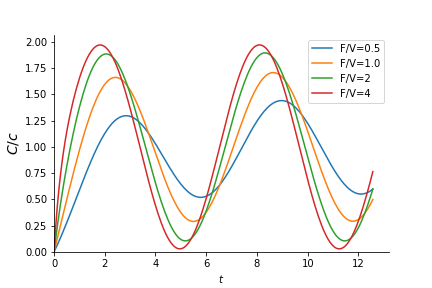| ◀ Previous | TOC |
Solutions for Quizzes and Exercises
Macroscopic Balance
Solution, Exercise 1
which is a first order linear (ordinary) differential equation.
Integrating factor
Equality
\[\int e^{at} \sin {bt} \, dt = \frac{e^{at}}{a^2 + b^2}\left( a \sin bt - b \cos bt \right)\]
The general solution \(y\) is
which is a first order linear (ordinary) differential equation.
Integrating factor
Equality
\[\int e^{at} \sin {bt} \, dt = \frac{e^{at}}{a^2 + b^2}\left( a \sin bt - b \cos bt \right)\]
The general solution \(y\) is

Linear Ordinary Differential Equations
Solution, Quiz 1
(a.1) Linear
(a.2) Linear
(a.3) Nonlinear, term \(y^{(2)} y\) is nonlinear.
(a.4) Linear
(a.5) Linear
(a.6) Linear, equivalent to \(y^{(2)} + y^\prime + (1 + x^2) y = 0\)
(a.7) Nonlinear, term \(y^2\) is nonlinear.
(a.8) Nonlinear, term \(y^\prime y\) is nonlinear.
Linear Partial Differential Equations
Solution, Quiz 1
First, dividing the both sides of (xp. 1) by \(T_h - T_l\) does not affect the coefficient.
That is,
\begin{equation} \frac{\partial u}{\partial t} = \frac{k}{\rho C_p} \frac{\partial^2 u}{\partial x^2} \end{equation}
Next,
\begin{equation*} \frac{\partial^2 u}{\partial s^2} = \frac{\partial^2 u}{\partial (pL)^2} = \frac{\partial^2 u}{\partial x^2} \frac{1}{L^2} \end{equation*}
Note that constants can be freely moved between inside and outside of the integral.
Then we have
\begin{equation} \frac{\partial u}{\partial t} = \frac{k}{\rho C_p} \frac{1}{L^2} \frac{\partial^2 u}{\partial x^2} \end{equation}
Thus,
\[\alpha^2 = \frac{k}{\rho C_p L^2}\]
Dimension of \(\alpha^2\)
\[\left[ \frac{k L^2}{\rho C_p} \right] = \mathrm{\frac{\left[\frac{J}{s~m~K}\right]}{\left[\frac{kg}{m^3}\right]\left[\frac{J}{kg~K}\right]\left[m^2\right]} = \left[\frac{1}{s} \right]}\]
Solution, Quiz 2
Substitute \(t = s t_0\) for \(t\) in (xp. 1),
\[\frac{\partial u}{\partial (s t_0)} = \alpha^2 \frac{\partial^2 u}{\partial p^2}\]\[\frac{\partial u(p, s)}{\partial s} = t_0 \alpha^2 \frac{\partial^2 u(p, t)}{\partial p^2}\]That is, \(t_0 \alpha^2 = 1\), hence
\[t_0 = \frac{1}{\alpha^2} = \frac{\rho C_p L^2}{k}\]The dimension of \(t_0 = [ \mathrm s ]\)
| ◀ Previous | TOC |